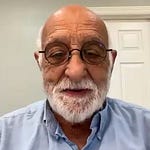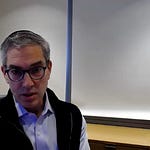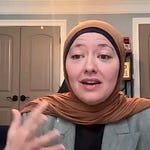I’ll be on book tour for Being Jewish After the Destruction of Gaza for the next few months. You’ll find a list of book-related events below.
I’m happy people are reading my book. But I know that many talented Palestinian authors don’t get the same attention. So, I hope people who buy my book also buy one by a Palestinian author. For instance, Fida Jiryis’ beautiful memoir, Stranger in My Own Land.
I hope readers also donate to people in Gaza. For instance, Hossam and Mariam Alzweidi, who were severely injured along with their four children by Israeli bombs and have been displaced ten times since October 7th. They’re trying to raise the money to seek medical care in Egypt. Their GoFundMe page is here.
Friday Zoom Call
This Friday’s zoom call, for paid subscribers, will be at 1 PM Eastern on Friday, our regular time. Our guest will be Arab Barghouti, the youngest son of Marwan Barghouti, the Palestinian political leader who has been in prison in Israel for the last 23 years. Arab is the head of international relations for the international campaign to release his father and all Palestinian political prisoners.
Friday’s zoom call is for all paid subscribers.
Book Tour
(We’ll update this every week.)
On Monday, March 24, I’ll be speaking at the University of Vermont.
On Tuesday, March 25, I’ll be speaking at Middlebury College.
On Monday, April 7, I’ll be speaking at the Harvard Divinity School.
On Tuesday, April 8, I’ll be speaking at the Harvard Kennedy School, and then later that night, at First Parish in Cambridge, Massachusetts, with the Palestinian human rights activist, Issa Amro.
On Wednesday, April 9, I’ll be speaking at United Parish in Brookline, Massachusetts.
On Tuesday, April 29, I’ll be speaking twice in Washington, DC: at Noon at Georgetown University and at 6 PM with Mehdi Hasan at Busboys and Poets.
On Sunday, May 4, I’ll be speaking at Kehilla Synagogue in Oakland/Piedmont, California.
On Sunday, May 25, I’ll be speaking with Debbie Whitmont at the Sydney Writers Festival in Sydney, Australia.
On Tuesday, May 27, I’ll be speaking at the Wheeler Center in Melbourne, Australia.
Book Reviews and interviews
Being Jewish After the Destruction of Gaza was reviewed (positively) in South Africa’s Daily Maverick and (negatively) in Britain’s Jewish Chronicle. I also discussed the book with Nathan Robinson of Currents Affairs and with Brown University’s Glenn Loury.
Sources Cited in this Week’s Video
A few years ago, I wrote about the absence in mainstream US discourse of the concept of “anti-Palestinianism.”
Response
In response to my video last week suggesting that Trump and establishment Jewish organizations are redefining what it means to be a Jew, Barnett Rubin suggests that this constitutes a Jewish version of the Islamic notion of “takfir.”
Things to Read
(Maybe this should be obvious, but I link to articles and videos I find provocative and significant, not necessarily ones I entirely agree with.)
Jewish Currents (subscribe!) translates and republishes Tawfiq Da’adli’s story “On the Squeezing.”
For the Foundation for Middle East Peace, I talked to Naji Abbas, Director of the Prisoners and Detainees Department for Physicians for Human Rights Israel, about Israel’s detention and torture of health care workers in Gaza.
In The Atlantic, Princeton President Christopher Eisgruber details the dangers of the Trump administration’s attack on Columbia.
A Jewish student at Columbia writes about his friend, Mahmoud Khalil.
Daniel Levy’s comments on Gaza at the United Nations.
Muhammad Shehada on what would happen if Hamas left Gaza.
See you Friday,
Peter
VIDEO TRANSCRIPT:
So, Columbia University has essentially capitulated to the Trump administration’s demands, and with implications for the future of Colombia and other American universities that would be very far reaching. We don’t know the full repercussions yet. But I think it’s just important to understand that—although Donald Trump is doing this because he wants to domesticate and cripple universities just because they could be centers of resistance and critical thought against his authoritarian rule in the same way that he wants to cripple and domesticate independent media, or law firms that might sue him, or the Justice Department that might be independent of his control, all these things, even though that’s clearly Trump’s motivation—his ability to use antisemitism effectively rests on the fact that there is a discourse about antisemitism that has existed long before October 7th, but then intensified since the October 7th massacre, that has been endorsed by many, many Democrats and therefore makes them kind of complicit in this.
And I think the critical thing we have to understand about what’s wrong with this discourse of antisemitism, which has helped lead us to this place, is not that it’s wrong to be very concerned about antisemitism. Of course, we should be very concerned about antisemitism. The problem is that when you discuss antisemitism in the context of the Israel and Palestine conflict, where there are two national groups there, one has to pair it with a conversation about anti-Palestinian bigotry, right. Talking about antisemitism in the context of Israel-Palestine is fundamentally different in that way than talking about it in the context of white nationalism or some other historical episode.
In this case, the question is how are people are being treated fairly and equally? Are they being discriminated against because of their position to this relationship between Israeli Jews and Palestinians? But one naturally has to ask the question about the other group as well, about Palestinians—if you think that Palestinians are people who deserve the same treatment as Jews, right. And so, if one imagined that the conversation about antisemitism was paired with a conversation about anti-Palestinian bigotry, I think the conversation about antisemitism would have to be radically different, right. Because when one asked the question do Jewish students feel uncomfortable or even unsafe when they hear slogans like ‘Palestine will be free from the river to the sea’ or ‘globalize the intifada,’ one would also have to ask the question how does it make Palestinian students feel when they hear the slogan, you know, ‘I stand with the IDF’ or ‘Israel has the right to defend itself,’ right?
And when we ask the question about harassment, are there Jewish students who are literally being targeted for wearing kippot, or other things, right. We would also ask the question, are there Palestinian students who are being targeted for wearing keffiyehs? Because I suspect that if there are Jewish students, tragically, you know, walking around Columbia’s campus or other campuses, who get yelled at because they’re wearing kippot, or they’re wearing a Star of David or whatever, I think it’s a pretty good guess that there are also Palestinian students who are getting called ‘terrorist’ or all kinds of nasty things, right, if they’re wearing a keffiyeh.
If we thought about the rules about protest, right, one of the things that Trump wants to do—but these universities have been doing ever since October 7th—is really clamp down on the rules around protest, we would have to ask the question, not just are Students for Justice in Palestine violating these new, very onerous rules about protest, but is the pro-Israel group violating those rules of protest? If we had task forces, right, to look at antisemitism, then we would also have task forces, not just on Islamophobia, but task forces on anti-Palestinian bigotry, right. It’s a different thing than Islamophobia. Most Muslims are not Palestinian, and not all Palestinians are Muslims. And if we imagine a world where we did all of those things, where we asked, ‘is there bigotry towards Palestinians?’ at the same time that we asked the question, ‘do we have bigotry towards Jews?’, then, in fact, the entire antisemitism conversation would be completely different, right.
Because if one had to concede that starting to censor a phrase like ‘globalize the intifada’ might also mean you had to censor the phrase, you know, ‘I stand with the IDF,’ and if you had to take the risk of an anti-Palestine task force staffed by a lot of Palestinian professors and think about what they might recommend in terms of changes to the university, right. Or if you had to apply these rules around protests equally and you began to think about the way that would impinge on the rights to protest of pro-Israel students, in fact, then all of a sudden, a lot of the push that’s being made for what universities should do would disappear, right? Because people would realize almost immediately that if it was applied equally to Palestinians, it would start to infringe upon them in ways that would be really problematic. It would force people to actually start to think about the importance of free speech, including free speech that makes people uncomfortable, right.
The only reason that people that you have this push to be so draconian in terms of academic freedom, in terms of rights to protest, is precisely because no one ever imagines that these principles might be applied to students who are accused of anti-Palestinian bigotry. And, of course, that’s because we have no language of anti-Palestinian bigotry in mainstream American political conversation because it’s simply assumed that Palestinians should be treated as inferiors. There’s no expectation that they would be treated equally in Israel and Palestine, where the vast majority of members of Congress are very supportive of the idea of a state based on Jewish legal supremacy. And similarly, there’s no expectation of that in the United States, right. But if there were that expectation, then everything that has happened with the debate about antisemitism and the way it’s now being used to really crush academic freedom and independence of universities just simply could not play out the way it is, right. It’s only because of the way in which Palestinians simply don’t count in this conversation, that we can have the kind of conversation about antisemitism that has led us into such a disastrous place.








